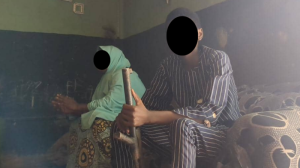Former Commissioners for Information in Ebonyi State, Chief Abia Onyeike and Dr Chike Emmanuel Onwe have called on journalists in the state to imbibe investigative journalism in their practices if they must survive the present citizen’s journalism era.
They said journalism as a profession has been charlatanism with everybody in the society now a journalist following the advent of social media and urged media practitioners to immediately switch to investigative journalism which should be the interest of every journalist instead of conventional journalism that is no longer fashionable.
Onyeike and Onwe spoke in Abakaliki, the state capital during a one-day training for journalists in the state organized by an online Media Platform; Ikenga Media with support from the Wole Soyinka Centre for Investigative Journalism and John Macater Foundation.
In his lecture on the topic “News Ethics and Social Responsibility in Nigeria Journalism: Reflections on Past and Present Realities”, Onyeike who was Deputy National President of Nigeria Union of Journalists (NUJ), said when journalists turn a blind eye to burning issues of the moment and ignore the socio-political crises of the day, they live a life of fallacy which they verbalize in fantasies.
He said “in the case of contemporary Nigeria, it is clear to us all that the country is sick in all its ramifications. The nation is plagued by numerous problems, just the same way that the states, local governments, and communities are overwhelmed by terrible developments.
“When last did we file stories on any of the numerous communal crises and their attendant killings and refugee problems associated with them? When last did you undertake an investigation into the monumental looting of public resources taking place at the various levels of government within your area of coverage?
“Coming down to Ebonyi state, how many times have we bordered to write a story or features on the missing NELAN Engineers who went to supervise the Ring-Road project at Effium after an altercation with a former governor of the state?
“How many journalists in Ebonyi State have bothered to do a thorough investigative report on the Effium crises14 and the massacre going on there which has left a horrible scenario of Internally Displaced persons (IDPs) scattered all over the place, with an estimated 5, 000 persons killed since early 2021 when the current wave of the crises started.
“How many Journalists have followed the Panel of Inquiry set up in 2021 on the Effium crises which submitted its report on 7th August 2021? Was a White Paper issued from the findings of the panel? The Panel report was suppressed and nobody asked questions.
“The sum of one hundred million naira(#100m) which was approved for the reconstruction of the Effium Market was swallowed. How can you talk about the rebuilding of a market in a war-torn community?
“ How many journalists were willing to write news reports on the misappropriation of the pensions and gratuities of Ebonyi State workers from 2015-2023? Even when the civil servants and retirees were dying instalmentally because of the unprecedented cruelty meted out to the working class in Ebonyi State, many journalists looked the other way. So how do you blame the people when they say they have lost confidence in the watchdog of society? Or when people allege that some journalists in Nigeria were on the payroll of the government or the powers that be?
“However, many reporters and journalists have often complained about their poor pay and harsh conditions of service. They find it difficult to engage in normal reportorial assignments that are not backed by logistics. Some of them are poorly paid, others are not paid at all.
Given the fact that investigative journalism requires resources to accomplish, one must be sympathetic to the journalists as they work under terrible conditions. They are handicapped and are often rendered vulnerable to those in power. Something has to be done by media employers to pay their workers handsomely to strengthen them in the discharge of their duties.
“My criticism of some Journalists is an in-house critique aimed at stimulating our efforts and commitment to the best ideals of this noble profession. It does not in any way detract from the great job you have been doing. We have to do more for this profession in particular and for posterity in general”, he stated.
In his own lecture which centred on investigative journalism, Dr Chike Onwe said it was only investigative journalists that will satisfy the curiosity and the information need of the public these days.
“I think this is a wake-up call and a challenge to journalists to answer this clarion call because you must improve on the job, you must be seen to be improving on the job. If you remain static where you are, last year, five years ago, you will get outdated, especially in the era of social media where everybody has become a journalist, trading on the same issue that we are trading on.
“We must show something different and the only thing that will give us that edge is our ability to go in-depth, our ability to scout for what is hidden, our ability to go beyond the ordinary.
“That is what gives us the advantage and that is what this program is making and I think we should take it up as a challenge and give ourselves a kind of notch to do what is needed in a time like this”, he stated.
Uche Ugboaja, Editor-in-Chief of Ikenga Online said the training was to enable journalists to brace up to the challenges in their jobs as the watchdog of the society and improve on them.
“We try to retrain journalists, giving them more capacity to do their jobs. Luckily, we are supported by the Wole Soyinka Centre for Investigative Journalism and the MacArthur Foundation.
“The idea is to help build capacity of journalists to help them to do their jobs well. We are covering the five states in the southeast.
“We know how difficult things are for journalists and for everybody in the country but if we can provide this little training here and there, it will help a lot, not just helping the journalists but also helping the society in terms of getting better delivery from the journalists”.



